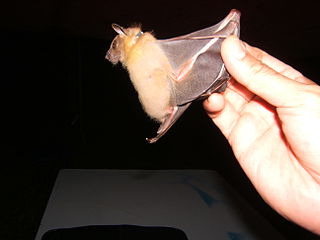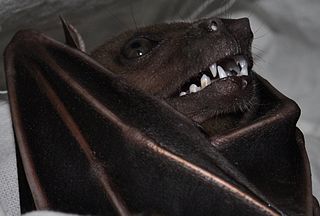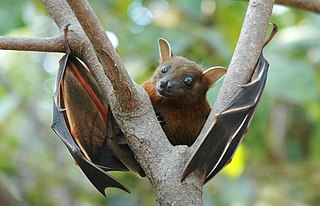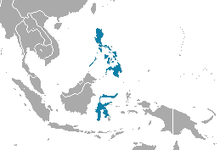
Nycteris comprises a genus of bats commonly called slit-faced or hollow-faced bats. They are grouped in the family Nycteridae. The bats are found in East Malaysia, Indonesia, and many parts of Africa.

Cynopterus is a genus of megabats. The cynopterine section is represented by 11 genera, five of which occur in Malaysia, namely, Chironax, Balionycteris, Penthetor, Dyacopterus, and Cynopterus. About 30 names for Cynopterus species have been proposed, but only 16 are taxonomically valid forms.

Blanford's fruit bat is a mountain species of megabat. It is found in several countries in South and Southeast Asia.

The greater short-nosed fruit bat, or short-nosed Indian fruit bat, is a species of megabat in the family Pteropodidae found in South and Southeast Asia.

The Indonesian short-nosed fruit bat is a species of megabat in the family Pteropodidae. It is endemic to Indonesia, and has three subspecies:

The Angolan fruit bat, Angolan rousette or Silky bat is a species of megabat in the family Pteropodidae. It is found in Angola, Burundi, Cameroon, Central African Republic, Republic of Congo, Democratic Republic of Congo, Kenya, Nigeria, Rwanda, Sudan, Tanzania, Uganda, and Zambia. Its natural habitats are subtropical or tropical moist lowland forest, moist savanna, and rocky areas.

The greater musky fruit bat is a species of megabat in the family Pteropodidae. It is endemic to the Philippines. It was named by Peters for Fedor Jagor.

The Bornean horseshoe bat is a species of bat in the family Rhinolophidae. It is found in Brunei, Cambodia, Indonesia, Laos, Malaysia, and Vietnam.

The Borneo fruit bat is a species of megabat found in the mountains of Borneo, specifically East Malaysia and Brunei. It is considered a subspecies of Aethalops alecto by some authors.

The lesser short-nosed fruit bat is a species of megabat within the family Pteropodidae. It is a small bat that lives in South Asia and Southeast Asia. It weighs between 21 and 32 grams, and measures 70 to 127 millimetres. It occurs in many types of habitat, but most frequently in disturbed forest, including lower montane forest and tropical lowland rain forest, plus gardens, mangroves, and vegetation on beaches.

Horsfield's fruit bat is a species of megabat native to South East Asia. It is named for Thomas Horsfield, an American naturalist who presented the type specimen to the British Museum.

The minute fruit bat is a species of megabat within the family Pteropodidae. It is found in Sumatra, Java, Borneo and Sulawesi.

The Nusatenggara short-nosed fruit bat is a species of megabat within the family Pteropodidae found in Indonesia. It has three subspecies:

The Aru flying fox is a Critically Endangered species of megabat found in the Aru Islands in Indonesia. It was described by Wilhelm Peters in 1867. It was formerly considered a subspecies of the black-bearded flying fox. The species is poorly known, and has not been encountered since the 19th century. It is classified as critically endangered by the IUCN and is listed on CITES appendix II.















